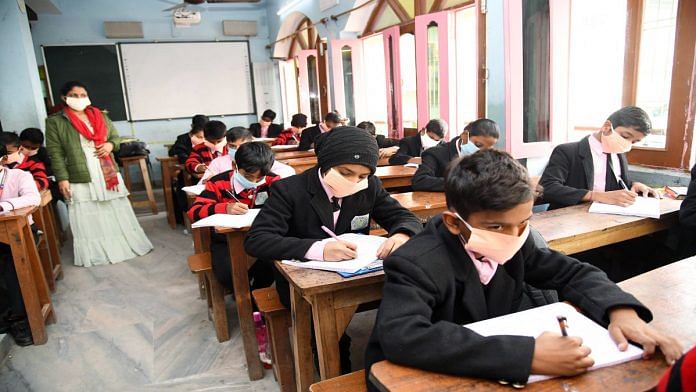New Delhi: Homeschooling and other alternative ways of school are all set to be accepted as a formal way of instruction. In the final National Credit Framework (NCrF) report Tuesday, the University Grants Commission (UGC) has recommended a set of sweeping changes to India’s school education system, including multiple exit and entry points for students, and a credits system.
The overarching policy, which comes under the Modi government’s larger National Education Policy (NEP) 2020, seeks to introduce multiple entry and exit options at school level for students who either want to go for vocational training or have to leave school midway for some reason.
This could come as relief to a number of students who have opted for homeschooling after the pandemic. There is currently no policy on homeschooling. Students are required to obtain their Class 10 and Class 12 board exam certificates as credentials for further opportunities.
The NCrF says homeschooling, online learning and alternative learning should be validated and students should be given certificates and diplomas for them.
“There are occasions when learners pursue alternative schooling, homeschooling, online schooling or have to give up their education midway for various reasons. The National Credit Framework will act as an enabler in this regard and regulators shall be required to define the entry and exit criteria of the programmes being offered by them,” the document reads.
It also seeks to establish credits — a measure of the number of hours a student has put in and the amount of coursework completed — at all levels. The credit system will replace the current system of scoring coursework.
First developed last October and released for public feedback, the NCrF aims at bringing school education, higher education and skilling under one assessment umbrella.
The framework has been jointly developed by multiple educational bodies — UGC, All India Council for Technical Education (AICTE), National Institute of Open Schooling (NIOS), National Council of Educational Research and Training (NCERT) and National Council of Vocational Education and Training (NCVET) — in order to facilitate “a seamless transition of students from school to college”, the policy document says.
The UGC’s notice advised schools to begin implementing the policy in phases.
The document’s release comes days after the National Curriculum Framework (NCF) recommended sweeping changes in school education, including introduction of two board exams, and an exit option after Class 10 to pursue vocational education.
Credit system
The final policy document released Tuesday says students will get credits on the basis of any prior learning that they have attained, including “family learning acquired through formal, informal or traditional methods”.
“This would also take into account learning acquired through family inheritance, work experience, cluster-based learning and creditising the same, thereby allowing the progression and mobility into the formal education system,” the policy document says.
According to the framework, an academic year will be defined by the number of hours a student puts in and credits will be provided to them accordingly at the end of each academic year.
The document also mentions that all students from Class 5 up to postgraduate levels will have to complete 1,200 academic hours in a year.
The credits will be awarded on the basis of classroom teaching/learning, laboratory work, class projects, sports and games, yoga, physical activities, performing arts, music, handicraft work, social work, NCC, bag-less days, examinations, vocational education, training and skilling, as well as field visits, the report says.
Students will also get credits for participating in Olympiads, science quizzes, internships, and taking up jobs while they are studying in college, the report adds.
(Edited by Uttara Ramaswamy)
Also Read: Congress to BJP, Ambedkar cartoons to 2002 riots, NCERT syllabus’ run-in with political axe



